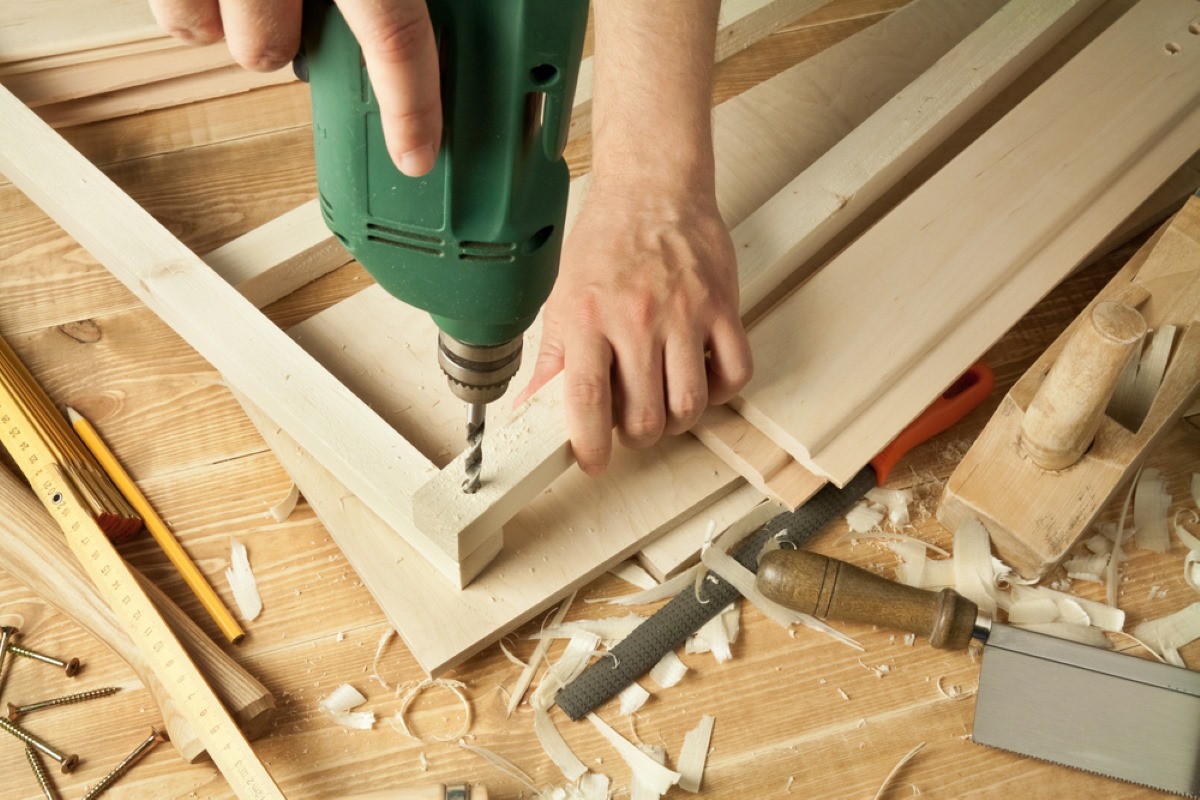

Articles
Why Is Woodworking Important
Modified: October 20, 2024
Discover the significance of woodworking through detailed articles. Whether you're a beginner or a seasoned woodworker, explore valuable insights and techniques for your craft.
(Many of the links in this article redirect to a specific reviewed product. Your purchase of these products through affiliate links helps to generate commission for Storables.com, at no extra cost. Learn more)
Introduction
Woodworking is a timeless craft that has been practiced for centuries. From ancient civilizations to the modern era, woodworking has played a crucial role in human culture and development. It is the art of creating functional and artistic objects using wood as the primary material. Whether it’s crafting furniture, constructing buildings, or carving intricate designs, woodworking has always been valued for its practicality, beauty, and the sense of accomplishment it brings.
Woodworking has a rich and fascinating history that dates back to the earliest recorded civilizations. Mesopotamians, Egyptians, Greeks, and Romans all had advanced woodworking techniques and utilized wood in various aspects of their lives. From building structures like temples and palaces to creating intricate furniture and decorative artifacts, woodworking was an integral part of their daily lives.
In the modern world, woodworking skills continue to hold significant importance. Despite the rise of mass production and synthetic materials, the value of handcrafted woodworking remains unmatched. There is a growing appreciation for the skill and artistry involved in woodworking, and people are increasingly seeking handmade, high-quality wood products.
Woodworking is not just about creating beautiful objects; it also brings numerous benefits to individuals and society as a whole. From economic impact to environmental sustainability, personal development to health benefits, woodworking offers a well-rounded set of advantages that make it an important craft in today’s society.
In this article, we will delve deeper into the historical significance of woodworking, explore the importance of woodworking skills in modern society, discuss the economic impact and environmental benefits of woodworking, highlight the creativity and personal development it offers, and shed light on the health and well-being benefits of engaging in woodworking activities. Let’s take a closer look at why woodworking is a skill that holds such great importance in our lives.
Key Takeaways:
- Woodworking is a timeless craft with historical significance, offering economic impact, environmental benefits, and personal well-being. It embodies sustainability, creativity, and a connection to our heritage.
- Engaging in woodworking promotes craftsmanship, problem-solving, and mindfulness. It fosters a sense of accomplishment, supports local economies, and contributes to a sustainable lifestyle.
Read more: Why Are Hand Tools Important
Historical Significance of Woodworking
Woodworking has a profound historical significance, as it has been a fundamental craft throughout human civilization. From the earliest societies to the present day, woodworking has played a crucial role in shaping human culture, architecture, and technological advancements.
One of the earliest known woodworking techniques was seen in ancient Egypt, where intricate woodworking skills were used to construct furniture, boats, and even the famous wooden burial tombs of the pharaohs. In ancient Greece, woodworking reached new heights with the construction of magnificent structures like the Parthenon and the intricate carving of statues.
During the Middle Ages, woodworking evolved into a highly specialized craft with the emergence of skilled carpenters and joiners who constructed grand castles, cathedrals, and furniture. The Renaissance period saw the resurgence of woodworking as a fine art, with master woodworkers creating exquisite furniture, paneling, and intricate woodcarvings.
In addition to creating functional and aesthetic objects, woodworking also played a vital role in technological advancements throughout history. The development of woodworking tools such as saws, planes, and chisels revolutionized the craft and enabled woodworkers to create more complex and precise designs. The invention of steam-powered machines during the Industrial Revolution further transformed woodworking, allowing for mass production and the creation of diverse wooden products.
Woodworking techniques and traditions have been passed down through generations, preserving the artistry and skills developed over centuries. In many cultures, woodworking is deeply rooted in their heritage and considered an essential part of their identity. From Japanese joinery techniques to Scandinavian woodworking styles, each region has its unique approach to woodworking that reflects its cultural values and history.
Today, woodworking continues to carry its historical significance. It connects us to our ancestors, reminds us of the craftsmanship of the past, and allows us to appreciate the beauty and versatility of wood as a material. Whether it’s the preservation and restoration of historical wooden structures or the creation of modern masterpieces, woodworking pays homage to our shared human history and the enduring legacy of this craft.
Importance of Woodworking Skills in Modern Society
In our modern, fast-paced world, woodworking skills may seem outdated or unnecessary. However, the importance of woodworking in today’s society cannot be overstated. Here are several reasons why woodworking skills continue to hold significant value in the modern era:
- Craftsmanship and Quality: In a world dominated by mass-produced goods, handmade wooden products crafted with precision and care stand out. Woodworking skills allow individuals to create high-quality, durable, and unique items that add value to their lives and to the world around them.
- Customization and Personalization: Woodworking skills empower individuals to customize their furniture, home decor, and other wooden objects according to their specific needs and preferences. Whether it’s a custom-made table or a personalized wooden gift, woodworking allows for a level of personalization that mass-produced items cannot match.
- Sustainable Living: With increasing concerns about environmental sustainability, woodworking offers a sustainable alternative to mass production and disposable culture. By creating long-lasting wooden objects that can be repaired or repurposed, we reduce waste and promote a more environmentally friendly way of living.
- Connection to Nature: Woodworking allows individuals to engage with nature on a deeper level. By working with natural materials, woodworkers connect with the beauty and integrity of the natural world. This connection fosters a sense of appreciation and responsibility toward our environment.
- Problem-Solving and Creativity: Woodworking is a craft that requires problem-solving skills and creativity. From designing and planning projects to overcoming challenges during construction, woodworking stimulates the mind and encourages innovative thinking. These skills translate to other areas of life, including problem-solving in professional settings.
- Therapeutic Benefits: Engaging in woodworking activities has been found to have therapeutic benefits. It can reduce stress, increase mindfulness, and provide a sense of accomplishment. Woodworking allows individuals to focus their attention, disconnect from digital distractions, and experience a sense of fulfillment and satisfaction.
Woodworking skills are not limited to professionals. They can be learned and practiced by anyone, regardless of age or background. Woodworking classes and workshops provide opportunities for individuals to develop their skills and tap into their creative potential.
Ultimately, woodworking skills enrich our lives by fostering craftsmanship, promoting sustainability, enhancing personalization, and providing a connection to nature. In our increasingly digital and disposable society, woodworking stands as a testament to the value of slow, deliberate, and meaningful craftsmanship, reminding us of the importance of hands-on skills in the modern world.
Economic Impact of Woodworking
Woodworking has a significant economic impact, both on a small-scale individual level and on a larger societal level. Let’s explore the various ways in which woodworking contributes to the economy:
- Job Creation: Woodworking provides employment opportunities for a wide range of individuals, from skilled carpenters and furniture makers to woodworkers in manufacturing factories. The demand for handcrafted wooden products and custom-made furniture continues to grow, creating job opportunities in the woodworking industry.
- Small Businesses and Entrepreneurship: Woodworking allows individuals to start their own small businesses and pursue entrepreneurship. Crafting and selling wooden products, setting up woodworking studios, or offering woodworking classes can be a viable business venture for those with woodworking skills and creativity. This not only supports individual livelihoods but also contributes to the local economy.
- Wood Industry Supply Chain: Woodworking relies on a robust supply chain, including the sourcing of wood materials, equipment, and tools. From sawmills and timber suppliers to hardware stores and specialized woodworking suppliers, these businesses benefit from the demand created by woodworkers. The supply chain creates jobs and generates revenue throughout the woodworking industry.
- Exhibition and Trade Shows: Woodworking exhibitions and trade shows provide a platform for woodworkers to showcase their skills and products. These events not only promote the craft but also attract visitors and generate revenue for the host cities and local businesses. They also provide networking and business opportunities for woodworkers, leading to potential collaborations and contracts.
- Tourism and Cultural Heritage: Woodworking traditions and craftsmanship can become major tourist attractions, drawing visitors to regions known for their skilled woodworkers. This tourism creates opportunities for local businesses, such as hotels, restaurants, and souvenir shops. It also helps preserve cultural heritage and traditional woodworking techniques, ensuring their sustainability for future generations.
As the demand for handmade, unique, and sustainable products continues to rise, the woodworking industry plays an important role in meeting those needs. Woodworkers contribute to the local economy by producing goods that are often valued at a premium due to their craftsmanship and quality. Moreover, the economic impact of woodworking extends beyond individual woodworkers, benefiting related industries and supporting the overall growth of the economy.
It’s important to recognize the economic significance of woodworking and support the growth of this industry. By purchasing handcrafted wooden products, supporting local woodworkers, and promoting the value of craftsmanship, individuals can contribute to the sustainable development of the woodworking economy.
Environmental Benefits of Woodworking
Woodworking offers several environmental benefits that make it a sustainable and eco-friendly craft. Let’s explore some of the ways in which woodworking positively impacts the environment:
- Renewable and Sustainable Material: Wood is a renewable resource, meaning it can be replenished through responsible forest management practices. When wood is responsibly sourced from sustainably managed forests, it allows for the growth and regeneration of new trees, contributing to the long-term health of our ecosystems.
- Carbon Sequestration: Trees absorb carbon dioxide from the atmosphere and store it in their wood fibers. By utilizing wood in woodworking projects, we effectively sequester carbon and prevent it from contributing to greenhouse gas emissions. In this way, woodworking helps mitigate climate change and reduce our carbon footprint.
- Reduced Energy Consumption: Compared to other materials such as steel or plastic, woodworking requires less energy in manufacturing. The processing of wood involves relatively low-energy processes, contributing to the overall energy efficiency of woodworking. Additionally, wood has excellent insulation properties, reducing energy consumption for heating and cooling in buildings constructed using wood.
- Waste Reduction and Recycling: Woodworking promotes waste reduction and recycling. Wood offcuts and scraps can be repurposed into smaller objects or used as fuel for biomass energy. Additionally, wooden furniture and objects can often be repaired or refurbished, extending their lifespan and reducing the need for new manufacturing.
- Biodegradability: Wood is a naturally biodegradable material. When wooden products reach the end of their useful life, they can easily decompose without leaving behind harmful residues or contributing to landfills. This reduces the environmental impact associated with disposal and waste management.
Furthermore, woodworking often prioritizes craftsmanship and the use of natural finishes, such as oils and waxes, that are non-toxic and environmentally friendly. This contrasts with many mass-produced products that may contain harmful chemicals or synthetic materials that can be detrimental to both human health and the environment.
By supporting woodworking and choosing wooden products, we can contribute to sustainable practices and a healthier planet. It is essential to prioritize responsible sourcing of wood and support organizations that promote sustainable forestry management. When done responsibly, woodworking can serve as a model for environmentally conscious production and consumption, proving that beauty, functionality, and sustainability can coexist.
Woodworking is important because it allows for the creation of functional and beautiful items, promotes creativity and problem-solving skills, and provides a sense of accomplishment and satisfaction.
Read more: Why Are Pillows Important
Creativity and Personal Development in Woodworking
Woodworking offers a unique opportunity for creativity and personal development. Engaging in this craft provides numerous benefits that go beyond the final product. Let’s explore how woodworking nurtures creativity and contributes to personal growth:
- Expression of Artistry: Woodworking allows individuals to express their artistic vision and creativity. From designing unique furniture pieces to carving intricate details, woodworkers have the freedom to bring their ideas to life. The process of transforming raw wood into a finished object is a fulfilling and rewarding experience.
- Problem-Solving Skills: Woodworking requires creative problem-solving. From analyzing design challenges to troubleshooting issues during construction, woodworkers develop their ability to think critically and find innovative solutions. These problem-solving skills can be applied to other areas of life and contribute to personal and professional growth.
- Persistence and Patience: Woodworking is a craft that demands patience and perseverance. Working with wood requires precision and attention to detail, often involving repetitive tasks. Woodworkers learn to embrace the process, overcome obstacles, and appreciate the time and effort required to achieve their desired outcome.
- Learning and Skill Development: Woodworking offers endless opportunities for learning and skill development. Whether it’s mastering new techniques, exploring different joinery methods, or experimenting with various finishes, woodworkers continuously expand their knowledge and enhance their craftsmanship. Learning and growing in woodworking can be a lifelong journey.
- Self-Confidence and Accomplishment: Completing a woodworking project instills a sense of accomplishment and boosts self-confidence. Seeing the transformation of raw materials into a finished piece brings a deep sense of pride and satisfaction. Woodworking encourages individuals to set goals, work diligently, and experience the joy of achieving tangible results.
- Emotional Well-being: Engaging in woodworking can have a positive impact on mental and emotional well-being. The focus required during woodworking activities can provide a sense of peace and mindfulness, allowing individuals to temporarily disconnect from stressors and find solace in the creative process. Woodworking can also provide a healthy outlet for self-expression and emotional release.
- Social Connections: Woodworking can foster social connections and community-building. Joining woodworking classes, workshops, or participating in woodworking groups allows individuals to connect with like-minded individuals, share ideas, and learn from each other. This sense of community can provide support, motivation, and inspiration on the woodworking journey.
Woodworking serves as both a creative outlet and a tool for personal development. It nurtures self-expression, fosters problem-solving skills, and boosts self-confidence. The continuous learning and skill development in woodworking not only enhance craftsmanship but also contribute to personal growth in various aspects of life. Engaging in woodworking can be a fulfilling and enriching experience that fosters creativity, self-discovery, and a sense of accomplishment.
Health and Well-being Benefits of Woodworking
Woodworking offers numerous health and well-being benefits, making it a fulfilling and therapeutic activity. Engaging in this craft promotes physical, mental, and emotional well-being. Let’s explore the ways in which woodworking positively impacts health:
- Stress Relief and Relaxation: Woodworking provides an escape from the demands and pressures of daily life. It allows individuals to focus their energy and attention on creating something with their hands, promoting a sense of relaxation and stress relief. The rhythmic movements and the tactile nature of working with wood can have a calming effect on the mind and body.
- Mental Stimulation and Cognitive Function: Woodworking stimulates the brain and enhances cognitive function. Planning and executing woodworking projects involve problem-solving, spatial awareness, and attention to detail. Engaging in these mental activities can improve memory, concentration, and overall cognitive skills.
- Physical Fitness and Coordination: Woodworking involves physical skills that contribute to overall fitness and coordination. From carrying, sawing, and sanding wood to maneuvering tools and operating machinery, woodworking requires strength, dexterity, and coordination. Regular woodworking activities can improve muscle tone, physical endurance, and hand-eye coordination.
- Sensory Stimulation: Woodworking engages multiple senses, providing a rich sensory experience. The smell of sawdust, the feel of wood grain, and the sound of tools in action create a multisensory environment that can be both invigorating and grounding. This sensory stimulation can enhance mindfulness and a deeper connection to the present moment.
- Time Management and Organization: Woodworking involves planning and managing time effectively. Breaking down a project into manageable tasks and setting goals helps develop time management skills. Woodworkers also learn to maintain an organized workspace, improving efficiency and productivity not only in woodworking but also in other areas of life.
- Social Interaction and Community: Woodworking provides opportunities for social interaction and community involvement. Joining woodworking classes, workshops, or participating in woodworking groups allows individuals to connect with others who share a passion for the craft. This social interaction can foster a sense of belonging, support, and camaraderie.
- Sense of Accomplishment and Self-esteem: Completing a woodworking project brings a sense of accomplishment and boosts self-esteem. Seeing the tangible results of one’s effort and craftsmanship fosters a sense of pride and self-worth. Woodworking projects, whether big or small, serve as constant reminders of one’s abilities and capabilities.
Woodworking is not just a hobby; it is a holistic activity that promotes overall well-being. By engaging in woodworking, individuals can experience stress relief, mental stimulation, physical fitness, sensory satisfaction, and a sense of achievement. Woodworking allows for personal growth, improved cognitive function, and a greater sense of connection to oneself and the surrounding world.
Woodworking as a Sustainable Hobby
Woodworking is not only a creative and fulfilling hobby but also a sustainable one. Embracing woodworking as a hobby allows individuals to contribute to a more environmentally friendly lifestyle. Here are some reasons why woodworking is a sustainable hobby:
- Use of Renewable Materials: Wood, the primary material in woodworking, is a renewable resource. Responsibly sourced wood comes from sustainably managed forests, where trees are replanted to ensure a continuous supply. By using wood from sustainable sources, woodworkers minimize their impact on deforestation and support the ethical use of natural resources.
- Reduction of Waste: Woodworking encourages the reduction of waste through careful material selection and efficient use of resources. Experienced woodworkers tend to plan their projects meticulously to minimize wood waste. Additionally, woodworking allows for the repurposing of offcuts and scraps, reducing the amount of discarded wood.
- Repair and Restoration: Woodworking promotes repair and restoration of wooden objects. Instead of discarding damaged or worn-out furniture, woodworkers can refurbish and breathe new life into them. This sustainability mindset extends the lifespan of wooden items and reduces the need for new manufacturing.
- Local and Handmade: Woodworking often emphasizes local production and handmade craftsmanship. By supporting local woodworkers and artisans, individuals contribute to their local economy and reduce carbon emissions associated with long-distance transportation. Handmade wooden products also carry a reduced environmental footprint compared to mass-produced items that require extensive energy and resources for manufacturing.
- Upcycling and Repurposing: Woodworking offers endless opportunities for upcycling and repurposing materials. Old furniture, pallets, or salvaged wood can be transformed into new and functional pieces, giving them a second life. Upcycling and repurposing contribute to waste reduction and showcase the creativity and ingenuity of woodworkers.
- Sustainable Finishing Techniques: Woodworkers often prioritize the use of environmentally friendly finishes and treatments. Natural oils, waxes, and water-based stains are commonly used alternatives to toxic and chemical-laden finishes. These eco-friendly options minimize the release of harmful substances into the environment and promote healthier living spaces.
- Education and Awareness: Woodworking as a hobby provides an opportunity for educating oneself and others about sustainable practices. By sharing knowledge and promoting sustainable woodworking techniques, woodworkers can inspire others to adopt eco-friendly approaches in their own projects, further spreading the principles of sustainability.
By embracing woodworking as a sustainable hobby, individuals become active participants in promoting environmentally conscious practices. Through responsible material sourcing, waste reduction, upcycling, and promoting local craftsmanship, woodworkers can make a positive impact on both a personal and a global scale.
Woodworking is not only a hobby that brings joy and satisfaction but also a pathway towards a more sustainable lifestyle. It aligns with the principles of ecological responsibility, resource conservation, and mindful consumption. As more individuals embrace the art of woodworking, the sustainable mindset embedded within this craft can help create a more sustainable future for all.
Conclusion
Woodworking holds immense importance in our society, both from a historical and modern perspective. This timeless craft has been an integral part of human culture for centuries, shaping our aesthetics, architecture, and technological advancements. Its historical significance serves as a testament to the enduring legacy of woodworking as a craft.
In the modern era, woodworking continues to be highly valued for its numerous benefits. It not only allows for creative expression and personal development but also has a substantial economic impact. Woodworking skills contribute to job creation, support small businesses, and stimulate the wood industry supply chain.
Additionally, woodworking offers significant environmental benefits. By utilizing wood, a renewable resource, and promoting sustainable practices, woodworkers contribute to carbon sequestration, waste reduction, and the conservation of our natural resources. Woodworking serves as a model for embracing sustainability in craftsmanship.
Beyond its economic and environmental impact, woodworking brings important health and well-being benefits. It promotes relaxation, stimulates the mind, enhances physical coordination, and fosters a sense of accomplishment and self-esteem. Woodworking fosters mindfulness, encourages problem-solving skills, and provides opportunities for social connections.
Woodworking is a sustainable hobby that empowers individuals to create unique, high-quality products while minimizing their impact on the environment. From upcycling materials to responsible sourcing, woodworking reflects a commitment to ethical and ecological practices.
In conclusion, woodworking is an art that enriches our lives in multifaceted ways. Its historical significance, economic impact, environmental benefits, and contribution to personal well-being make it a craft worth embracing and preserving. As we continue to appreciate and support woodworking, we ensure its continuity as a symbol of creativity, sustainability, and human ingenuity.
Frequently Asked Questions about Why Is Woodworking Important
Was this page helpful?
At Storables.com, we guarantee accurate and reliable information. Our content, validated by Expert Board Contributors, is crafted following stringent Editorial Policies. We're committed to providing you with well-researched, expert-backed insights for all your informational needs.















0 thoughts on “Why Is Woodworking Important”